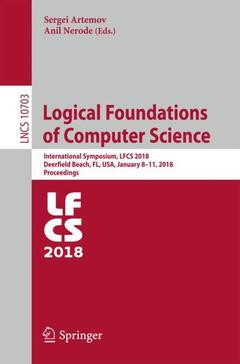Logical Foundations of Computer Science, 1st ed. 2018 International Symposium, LFCS 2018, Deerfield Beach, FL, USA, January 8-11, 2018, Proceedings Theoretical Computer Science and General Issues Series
Coordonnateurs : Artemov Sergei, Nerode Anil

Includes supplementary material: sn.pub/extras
Date de parution : 11-2017
Ouvrage de 369 p.
15.5x23.5 cm
Disponible chez l'éditeur (délai d'approvisionnement : 15 jours).
Prix indicatif 52,74 €
Ajouter au panierThèmes de Logical Foundations of Computer Science :
Mots-clés :
constructive mathematics and type theory; homotopy type theory; logic in computer science; automata and automatic structures; logical foundations of programming; logical aspects of computational complexity; logic programming and constraints; domain theory logics; logical foundations of database theory; linear logic; epistemic and temporal logics; distributed system logics; Computer science; Artificial intelligence; Problem solving; Theorem proving; Formal logic; Finite element method; Modal logic; Modal analysis



